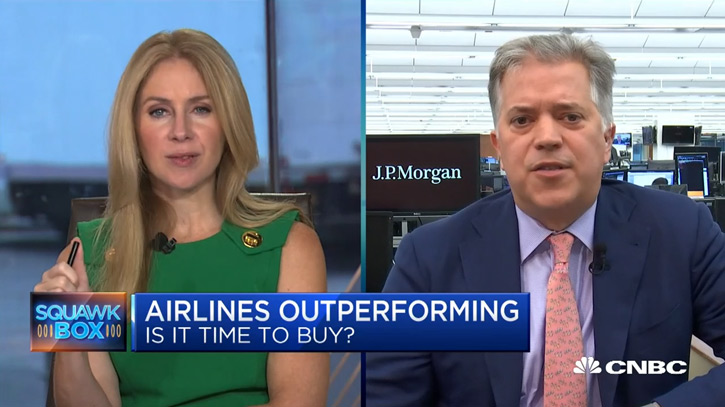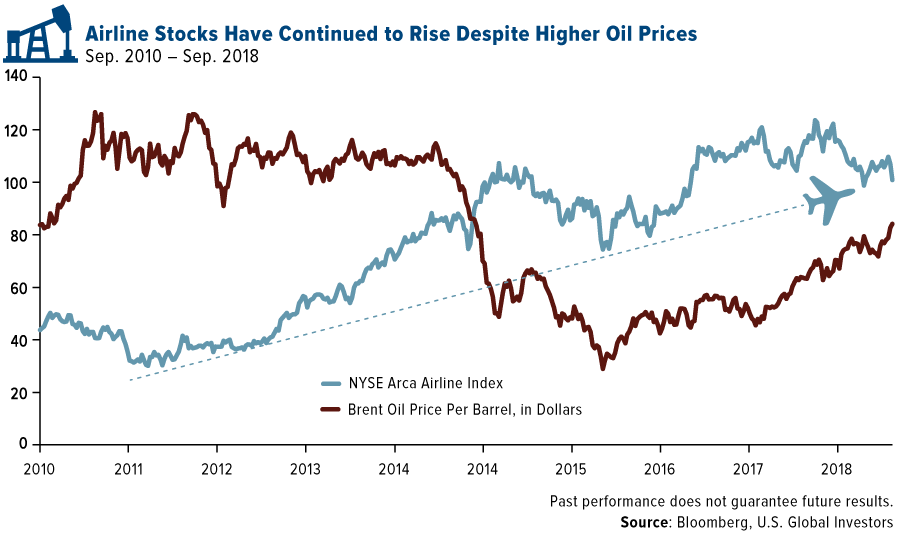
It seems intuitive enough: When oil prices rise, airline profits fall.
But there could be a lot wrong with this line of reasoning, according to Jamie Baker, J.P. Morgan’s lead airlines equity analyst. Baker appeared on CNBC recently to make the case that airline investors “don’t want to see cheap fuel”—the implication being that cheap fuel can actually work against airlines.
Speaking with CNBC’s Becky Quick, Baker explained that lower oil prices “leads to a breakdown in discipline, it leads to too much growth, it leads to reckless competitive behavior.”
Imagine an already-hyperactive child on a sugar rush—except with the child representing the airline industry and sugar representing cheap fuel. There’s nothing wrong with a little sugar on occasion, but sugar rushes, as most parents and grandparents can attest, rarely end well.
Baker went on to say that higher oil prices, coupled with a stronger U.S. economy and tightening airline capacity, have created “the best fundamental setup that [he has] seen since probably autumn of 2014.”

A Surging U.S. Economy Supports Commercial Air Travel Demand
The U.S. economy grew 4.1 percent during the second quarter of 2018, its fastest pace since 2014. With unemployment currently at a multi-decade low, wage growth hit a nine-year high of 2.9 percent in August, and median household income in 2017 climbed to $61,372, the most on record. U.S. consumer confidence, as measured by the Conference Board, reached an 18-year high in September.
These factors, we believe, support robust commercial air travel demand, while higher fuel costs, according to Baker, support capacity restraint.
“We believe now is an exceedingly strong time for investors to be looking at this space,” said Baker, who has ranked first a number of times in the airlines sector of Institutional Investor’s All-America Research Team. He added that “higher rates are reflective of the strong economy, but the strong economy has also helped us with oil prices.”
Baker is not alone in his position on oil prices. In October 2016, analyst Hunter Keay of Wolfe Research similarly told CNBC that higher fuel costs are “good for airlines.” According to Keay, “Capacity discipline and fundamental behaviors are far more important than the amount of money [airlines] earn… High oil prices create that dynamic.”
To watch Jamie Baker’s full CNBC interview, click here.
To select the members of the All-America Research Team, Institutional Investor solicits the opinions of directors of research and heads of investment at institutions with major securities holdings in the U.S. Rankings are determined strictly by using numerical scores. Investor takes the number of votes awarded to each analyst and weights the votes based on the size of the institution responding and the place it awards to that analyst (first, second, third or fourth).
The Consumer Confidence Index (CCI) Survey is an index by The Conference Board that measures how optimistic or pessimistic consumers are with respect to the economy in the near future.
The NYSE Arca Airline Index is a modified equal- dollar weighted index designed to measure the performance of highly capitalized and liquid international airline companies. The Index tracks the price performance of selected local market stocks or American depository receipts (ADRs) of major U.S. and overseas airlines.
U.S. Global Investors is not affiliated with J.P. Morgan.
